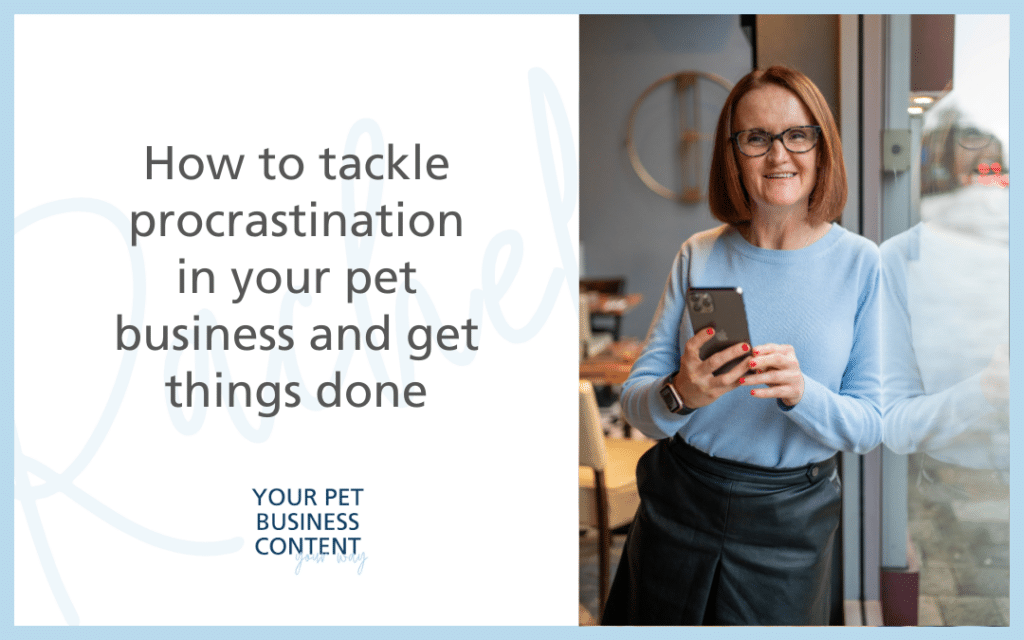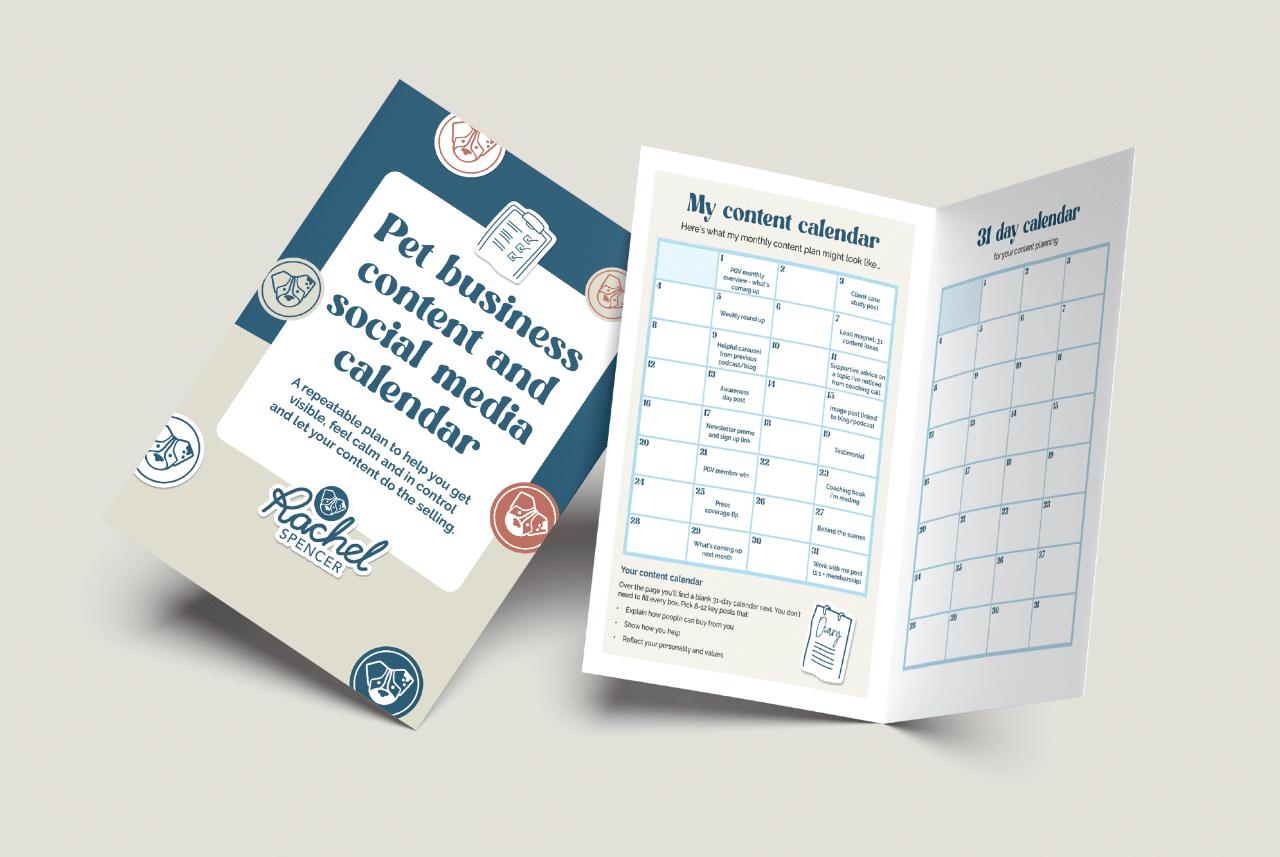Do you have tasks in your business that you keep putting off, and you can’t quite figure out why? Maybe it’s your accounts, social media, or even sending invoices that would really help your business.
In this episode of the Your Pet Business, Your Way podcast, I’m diving into the topic of procrastination—why we do it, how it impacts our work, and practical strategies to overcome it.
I explore the common reasons behind procrastination among pet business owners, including fear of failure, overwhelm, and perfectionism.
Plus personal experiences and insights from my coaching training, conversations in my community, and tips that can help you move forward.
We’ll discuss the importance of understanding your strengths, having accountability, and creating a supportive environment that fosters productivity.
Listen in on the player link below or you can read the key points covered as a blog.
Why do we procrastinate?
To start, it’s helpful to understand the reasons behind our procrastination. For many of us, it stems from fear of failure or boredom.
We might worry that we’re going to mess up a task, or find it tedious. For instance, I know I dread dealing with my accounts.
It’s easy to get caught up in other, seemingly more urgent tasks when we’d rather not face something we find daunting.
Another factor is overwhelm.
When a task feels massive and unmanageable – like planning a month’s worth of social media or tackling your client emails – it’s easy to do nothing at all.
I meant to hand in my finished website back in January, but it felt so overwhelming that I kept putting it off and it took months!
Perfectionism is another barrier. We often wait for the perfect moment or the ideal conditions before we tackle a task.
But there’s never going to be a perfect time. And whatever we create is unlikely to be perfect, so it’s about taking that first step.
The cost of procrastination
Procrastination isn’t just an inconvenience; it has costs.
The mental weight of knowing there’s a task hanging over you can be draining.
The longer we put something off, the more daunting it seems.
We can miss out on opportunities by delaying outreach to potential clients or partnerships, leading to lost chances for business growth.
And it makes you feel stressed! The nagging feeling of unfinished tasks can weigh on our minds, making us feel guilty and anxious and the longer you leave it the more daunting it becomes.
Identifying your strengths and gaps
Understanding your strengths and weaknesses is crucial in tackling procrastination.
Reflect on the tasks you find easy versus those that feel challenging. For example, I have a background in journalism, so writing comes naturally to me.
But handling numbers is painful!
By identifying your strengths, you can leverage them to tackle your tasks more effectively.
And recognising your gaps can guide you in seeking help or developing systems to make those tasks more manageable.
Practical strategies to overcome procrastination
Here are some strategies taken from The Coaches Casebook: Mastering the Twelve Traits that Trap Us in a chapter on this topic, plus ones that have helped me and my clients overcome procrastination:
- Step up and speak up: Clarifying the benefits of the tasks we avoid can motivate us to start. Share your goals with a community or a supportive group. When I posted about tackling my accounts in my Facebook group, I felt a sense of accountability that pushed me to get it done.
- Make your goal part of your identity: Shift your mindset to embody the identity of someone who accomplishes the tasks you set out to do. Instead of saying, “I wish I could write a blog,” say, “I am the kind of person who writes a blog every week.” This mental shift can make a significant difference.
- Break it down: Large tasks can feel overwhelming. Break them into smaller, manageable steps. For example, when redoing my website, I created an Asana board with specific tasks rather than trying to tackle everything at once.
- Write it down: Visualising your progress by writing down tasks can help alleviate the feeling of overwhelm. When you can see what you’ve accomplished, it becomes easier to tackle the remaining tasks. This is where journaling can help and it’s why I included the Words for When guided journaling section in my planner. It’s designed to help with procrastination, by guiding you through prompts that explore why you might be avoiding a task and how to take the first step forward.
- Tap into community support: Being part of a supportive community can help keep you accountable. In my Pet’s Get Visible membership, I’ve created a thread called “I Don’t Want To Do It Either,” where members share tasks they’re avoiding. Knowing others are in the same boat can be motivating.
Conclusion
Procrastination is something we all deal with, but using strategies like these can help you overcome it.
Focus on your strengths, create a supportive environment, and remember to break tasks down into manageable steps.
Ready to tackle procrastination and get organised?
If you’re feeling inspired to take charge of your marketing and overcome those tricky moments like procrastination, let me introduce you to a tool that can help – the Pet Business Content Planner and Companion.
This isn’t just a planner – it’s your go-to resource for staying organised, inspired, and visible.
Here’s what you’ll find inside:
- Monthly content prompts and awareness days: Perfect for planning engaging content and campaigns, featuring ideas from real pet businesses like Niki French’s Don’t Walk Your Dog Day and Sarah Jones’s Dogs in Yellow Day.
- Words for When: Guided journaling prompts to navigate challenges like imposter syndrome and procrastination or to celebrate your wins.
- Weekly overviews and habit trackers: Keep your tasks, goals, and progress all in one place.
- Goal setting and reflection pages: Break your big goals into actionable steps and track what’s working.
It’s designed specifically for pet business owners like you – whether you’re a dog trainer, pet shop owner, behaviourist, or blogger – to help you confidently show up, connect with your audience, and grow your business.
Get your copy now:
The planner is just £30 and available here: Pet Business Content Planner
Or, if you’d like extra support, check out the Planner & Pets Get Visible Membership Bundle for live coaching, workshops, and co-working: Planner Bundle Offer
If you’ve any questions, send me an email rachel@rachelspencer.co.uk and it would be great to see you there.
Links mentioned in this episode:
Is my Pets Get Visible membership right for you?
Join Pets Get Visible for just £15 for your first month
Read The Coaches Casebook: Mastering the Twelve Traits that Trap Us by Kim Morgan and Geoff Watts on Amazon
Further listening:
How to feel more comfortable and confident with self promotion
How to create systems and make your life less stressful with Amy Mitchell
How to create a pet business social media calendar
How to create a bank of anytime content
Why I trained as a coach and what that means for your pet business
What kind of coach is right for your pet business
Let’s connect on social media:
https://www.facebook.com/rachelspenceruk





